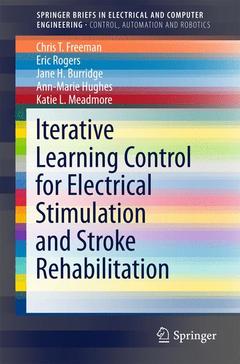Iterative Learning Control for Electrical Stimulation and Stroke Rehabilitation, 2015 SpringerBriefs in Control, Automation and Robotics Series
Auteurs : Freeman Chris T., Rogers Eric, Burridge Jane H., Hughes Ann-Marie, Meadmore Katie L.

Regaining upper limb movement is an important step in a return to independence after stroke, but the prognosis for such recovery has remained poor. Rehabilitation robotics provides the opportunity for repetitive task-oriented movement practice reflecting the importance of such intense practice demonstrated by conventional therapeutic research and motor learning theory. Until now this technique has not allowed feedback from one practice repetition to influence the next, also implicated as an important factor in therapy. The authors demonstrate how ILC can be used to adjust external functional electrical stimulation of patients? muscles while they are repeatedly performing a task in response to the known effects of stimulation in previous repetitions. As the motor nerves and muscles of the arm reaquire the ability to convert an intention to move into a motion of accurate trajectory, force and rapidity, initially intense external stimulation can now be scaled back progressively until the fullest possible independence of movement is achieved.
Iterative Learning Control: An Overview.- Technology Transfer to Stroke Rehabilitation.- ILC based Upper-Limb Rehabilitation— Planar Tasks.- Iterative Learning Control of the Unconstrained Upper Limb.- Goal-oriented Stroke Rehabilitation
Demonstrates the application of control engineering in next-generation healthcare
Shows how rehabilitation robots can be designed with supporting clinical evidence
Includes supplementary material: sn.pub/extras
Date de parution : 07-2015
Ouvrage de 124 p.
15.5x23.5 cm



